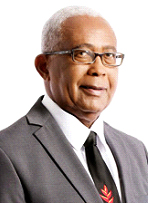(Trinidad Guardian) Students currently pursuing degrees in accredited tertiary education institutions will continue to receive Government Assisted Tuition Expenses (Gate) programme funding for their entire programme of study.
However, students who are registered to begin programmes this semester will only receive full funding for the academic year 2016/2017, while those seeking entry in 2017/2018 and beyond will have to undergo means testing in order to qualify.

And for the academic year 2017/2018 and beyond, tertiary level students will be required to pay 25 per cent of their tuition fees. Medical students seeking to study at the St George’s University and people over 50 will also no longer be able to access the programme.
These are only a few of the major changes introduced to the Gate programme announced by Education Minister Anthony Garcia on Wednesday, following a special Cabinet meeting.
Presenting the list of 18 recommendations during a media briefing at the Office of the Prime Minister, St. Clair, Garcia assured they were taken in the best interest of the nation in light of the current economic crisis.
Deliberated on and accepted by the Cabinet, Garcia said the decisions were expected to yield an immediate savings of $100 million in the first year, increasing yearly until Government reaches their expenditure target of $500 million.
Among the long-term plans for the programme is Government’s intention to establish a National Education Savings Fund, which will provide tax incentives to private organisations to make fund contributions on behalf of the children of their employees, and fiscal incentives to encourage insurance companies and credit unions to invest in the development of education savings products.
Reinforcing Government’s official policy change regarding the Gate programme, Garcia said they were committed to retaining it but also ensuring that “it is relevant, easily accessible and available to all those who need it.”
Unwilling to rule out any future review of the Gate policy, Garcia said: “Of course, nothing in this world is cast in concrete and depends on how things go, there might be the possibility of changes but at present this is the official position of the Government.”
One of the major changes announced was that effective 2017, students whose household income falls below $10,000 would be eligible for 100 per cent funding, while students whose household income exceeds $10,000 would have to pay 25 per cent of their tuition fees.
Saying the methodology used to arrive at the $10,000 ceiling was instituted by the Task Force Committee who compiled the 70-page report, Garcia said Cabinet agreed to increase the figure from $9,000 so as to ensure no one was at a disadvantage in light of the current economic crisis.
“The report revealed that so far, with respect to Gate, most of the funding was accessed by persons in the middle and lower income brackets. We need to ensure we lift that bar so that persons in the lower income bracket can benefit,” he said.
Garcia said the process to be used to determine who is eligible would be administered by a special team from the ministry.
While relief swept across the current student population, medical students hoping to enroll at the St. George’s University had their hopes dashed after Garcia announced that Government was discontinuing funding new students.
